(18231 products available)


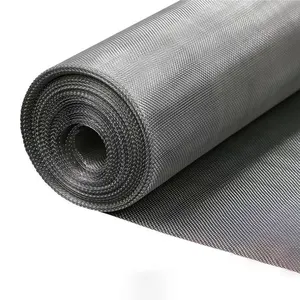
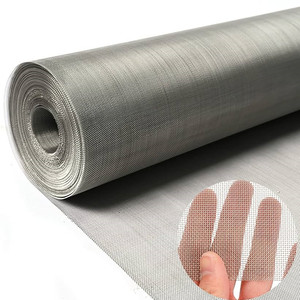













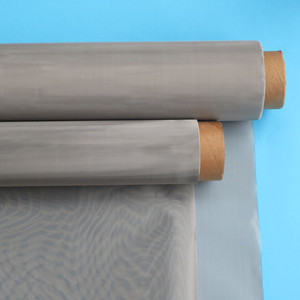




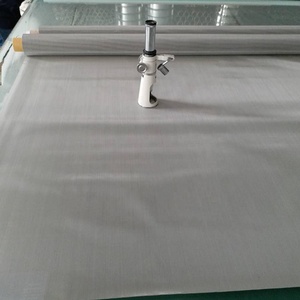

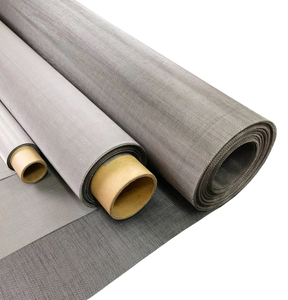








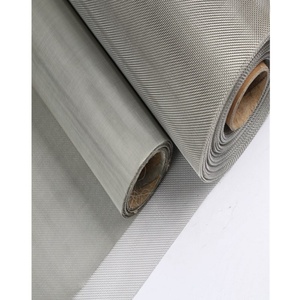
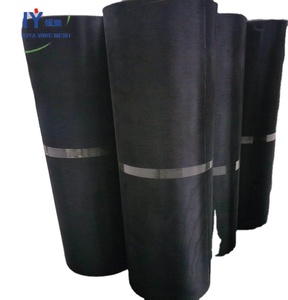

Wire cloth filter mesh is a woven wire product that users make by weaving fine wires into a net-like structure with small openings between the wires. The filter mesh is commonly used to separate solids from liquids or gases in various industries, such as food processing, pharmaceuticals, chemicals, and water treatment.
Based on the manufacturing materials, there are mainly two types of wire filter meshes: metal wire filter mesh and non-metal wire filter mesh.
Metal Wire Filter Mesh:
Generally, metal wire filter meshes are made of stainless steel, low carbon steel, brass, and other metal materials. They have strong durability, corrosion resistance, heat resistance, and good chemical stability. Therefore, metal wire filter meshes can work stably in high-temperature and high-pressure environments. Meanwhile, they can withstand various chemical substances without deformation or damage, making them suitable for use in chemical filtration and other applications that require resistance to aggressive chemicals.
Stainless Steel Wire Filter Mesh:
Stainless steel wire filter mesh is a versatile filtering medium manufactured from stainless steel wires. Stainless steel has a reputation for its great strength and resistance to rusting and staining. As a result, it is an excellent material for filter mesh, which must be both strong and clean. Stainless steel wire filter mesh provides a variety of filtration solutions for anything from drinking water to industrial liquids. It comes in an extraordinary range of grades, including 304 stainless steel wire mesh,316 stainless steel wire mesh, etc. Different products can meet different people's needs.
Non-Metal Wire Filter Mesh:
Non-metal wire filter mesh products are made of non-metal materials, such as nylon, PTFE, and polymer. Non-metal wire filter meshes are lightweight, have good corrosion resistance, can resist various chemicals, and be applied in different environmental settings. For example, nylon filter meshes are ideal for use in humid environments since they do not corrode or degrade.
Industrial filters are typically specified in terms of their overall dimensions and the specific woven wire gauge size that corresponds to the filtration application. They may also be specified in terms of the material used to manufacture the mesh, including any relevant standards or certifications. Presently used filtering meshes have length and width measurements as follows:
In addition, filter screens are specified according to their wire diameters, which are the thicker (vertical) and thinner (horizontal) wires intersecting to form different mesh sizes. Typical wire sizes range from 0.5 mm to 5.0 mm; for fine meshes, sometimes in the order of microns, wire sizes may be as low as 0.025 mm. These fine screens typically require stainless steel as a durable material. The mesh size is usually referred to as the number of openings per inch in a given filter screen. Standard mesh sizes are 4, 6, 8, 12, 16, 20, 28, 32, 40, 50, 60, 80, 100, 120, 140, 160, 200, 240, 280, 320, 400, 480, and 600.
Generally, finer mesh sizes with thinner wire diameters are used in industrial filter applications:
To achieve the desired durability and corrosion-resistant properties, specifications may call for particular varieties of stainless steel with specific chemical compositions corresponding to different wire and filter screen applications. The screens may also be specified in terms of food-grade PVC coating that is electrostatically used in safety applications to add additional protection, such as when installing screens in children's play areas.
Maintenance
Fine filter meshes will need to be replaced, but coarse meshes can be cleaned with suitable gentle detergents and brushes. Purified water should be used for the final rinse, and care should be taken to ensure that the cleaning chemicals do not corrode the material from which the filter screen is made. At critical points, wear-prone areas can be coated with a rust inhibitor, and local touch-up painting can be done while the system is in operation.
A wire filter's life can be increased by regular washing and maintaining its structural integrity by ensuring that components are intact, there is no ash accumulation, and there is gas leakage. Replacement schedules can be established based on visual inspections. However, additional considerations based on equipment operating conditions at high temperatures, under corrosive atmospheres, or in the presence of acid gas must be taken into account.
In the case of air filter mesh, users should be concerned with the bedding area of the foundry, the parting line area, the cooling passages, water, and vent passages, and areas of exposure to high humidity. Breathability is an essential factor, and it should be ensured that the filter's pores are not blocked. Performance degradation should be noticed, especially in the case of cooling passages that are prone to blocking due to corrosive deposits.
Woven wire mesh filters have a variety of applications across many industries due to their adaptability and usefulness. In the manufacturing industry, for example, they are used to filter out specific material production processes, such as lubricants and coolants. They are also used to dehydrate and separate solid materials in the pharmaceuticals and chemicals industries.
In the food processing industry, fine mesh filters are commonly used to strain and separate residue from liquids like juice, oil, milk, beer, and other types of alcoholic beverages. They are also used in the water treatment industry to filter pollutants, bacteria, and other contaminants from drinking water, wastewater, and industrial effluents. In the oil and gas industry, wire cloth filter mesh is used to strain and separate solid particles from crude oil, natural gas, and refining chemicals.
In the construction industry, they are used to filter out solid materials in paint, coating, and adhesive production. Additionally, wire cloth filters can be used in hydraulics and pneumatics. For example, they are used to separate solid particles from fluids and gases in pipelines and valves in various machinery.
In the automotive industry, mesh filters are used in car engines and fuel systems to separate solid particles and impurities in the fuel.
In the electronics industry, precise mesh filters are used in the production of microcircuits and semiconductors to filter out solid residues during the production process. Laboratory instruments use mesh filters in their analytical equipment to strain solid materials from liquids to obtain accurate results. Moreover, medical devices, such as blood filtration devices, use wire mesh filters in their systems to separate solid particles and impurities, thus preventing infections and ensuring patient safety.
With so many options available on the market, it can be quite challenging for business buyers to choose the correct wire filter mesh for their needs. To make an informed purchasing decision, buyers can consider the following factors:
Q1: What is the wire mesh filter diesel pump?
A1: The wire mesh filter in a diesel pump helps to avoid the passage of large particles of dirt, sediment, and rust into the injector. Therefore, it plays an important role in the proper functioning of the injector. This wire mesh is usually inside the diesel pump and can be cleaned by soaking it in a solution of vinegar and water.
Q2: What is the difference between wire mesh and wire netting?
A2: Wire mesh refers to the arrangement of wires parallel to each other, generally formed in a crisscross pattern to create square-shaped openings. On the other hand, wire netting is a synonymous term for a steel barrier made from fine strands or pins, frequently used to denote insect screens or fencing. Also, the holes in the wire netting are smaller than those in the wire mesh.
Q3: What is the difference between a filter and a mesh?
A3: Filter devices are made to capture contaminants and prevent them from passing through the other side, while tiny holes characterize mesh screens that allow for the free movement of air, liquids, and gases. Moreover, filters are manufactured from traditional materials like fiber, ceramic, and plastic, whereas filter mesh is usually made of stainless steel to withstand high temperatures and aggressive environments.